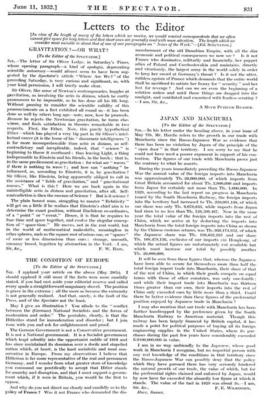JAPAN AND MANCHURIA
[To the Editor of the SPECTATOR.]
SIR,—In his letter under the heading above, in your issue of May 7th, Mr. Hardie refers to the growth in our trade with Manchuria since the Russo-Japanese War as evidence that there has been no violation by Japan of the principle of the "open door" in that territory. I am sorry to say that he could not have used a poorer argument in support of his con- tention. The figures of our trade with Manchuria prove just the contrary to what he asserts.
During the years immediately preceding the Russo-Japanese War the annual value of the foreign imports into Manchuria was approximately Tls. 20,000,000, of which imports from Great Britain accounted for about Tls. 3,000,000 and imports Iron'. Japan for certainly not more than Tls. 1,000,000. In 1929, according to the last report on progress in Manchuria issued by the South Manchuria Railway, the foreign imports into the territory had increased to Tls. 230,001,138, of which our share was only 'Hs. 9,070,833, while imports from Japan had risen to no less than Tls. 126,509,467. Now in the same year the total value of the foreign imports into the rest of China, which we arrive at by deducting the imports into Manchuria from the total foreign imports into China as shown by the Chinese customs returns, was Tls. 936,174,952, of which the Japanese share was Tls. 196,632,195 and OM share Tls. 108,478,136, exclusive of our imports via Hongkong, of which the actual figures are unfortunately not available but which must increase our total by possibly another 'lls. 20,000,000.
It will be seen from these figures that, whereas the Japanese have been able to secure for themselves more than half the total foreign import trade into Manchuria, their share of that of the rest of China, in which their goods compete on equal terms with those of other countries, was only one-finirth ; and while their import trade into Manchuria was thirteen times greater than our own, their imports into the rest of China only exceeded ours by little more than a third. Could there be better evidence than these figures of the preferential position enjoyed by Japanese trade in Manchuria ?
I may also mention that our trade with Manchuria has been further handicapped by the preference given by the South Manchuria Railway to American material. Though this railway has been largely financed by British capital, it has made a point for political purposes of buying aU its foreign engineering supplies in the United States, where its pur- chases during the past few years have considerably exceeded G$100,000,000 in value.
I am in no way unfriendly to the Japanese, whose good work in Manchuria I recognize, but no impartial person with any real knowledge of the conditions in that territory since the Russo-Japanese War can possibly deny that the policy which they have pursued there has very seriously hindered the natural growth of our trade, the value of which, but for the preferential rights claimed and enforced by Japan, would by now have far exceeded the absurdly low figure at which it stands. The value of the tad in IMO was about 3s.—I am,


































 Previous page
Previous page